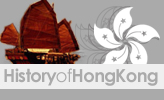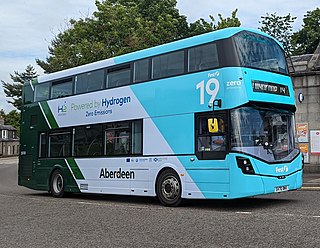
Strathclyde Partnership for Transport (SPT) is a regional transport partnership for the Strathclyde area of western Scotland. It is responsible for planning and coordinating regional transport, especially the public transport system in the area, including responsibility for operating the Glasgow Subway, the third-oldest in the world.

The history of bus transport in Hong Kong began with the introduction of the first bus routes in Hong Kong in the 1920s.
Central Scottish Omnibuses Ltd was a bus operating subsidiary of the Scottish Transport Group formed in June 1985 from Central SMT, and operated until July 1989 when it was merged with Kelvin Scottish to form Kelvin Central Buses.

Metro is the passenger information brand used by the West Yorkshire Combined Authority in England. It was formed on 1 April 1974 as the West Yorkshire Passenger Transport Executive (WYPTE), at the same time as the metropolitan county of West Yorkshire. The Metro brand has been used from the outset and, since the formal abolition of the WYPTE on 1 April 2014, it has remained the brand name of public transport in the region, overseen by the West Yorkshire Combined Authority, which is also responsible for the delivery of transport policies.

The Dennis Dominator was Dennis's first rear-engined double-decker bus chassis, it was launched in 1977.

Metro Cammell Weymann Ltd. (MCW) was a British bus manufacturer and bus body builder based at Washwood Heath in Birmingham, England. MCW was established in 1932 by Metro-Cammell's bus bodybuilding division and Weymann Motor Bodies to produce bus bodies.
Walter Alexander Coachbuilders was a Scottish builder of bus and coach bodywork based in Falkirk. The company was formed in 1947 to continue the coachbuilding activities of W. Alexander & Sons when their bus service operation was nationalised. After several mergers and changes of ownership it now forms part of Alexander Dennis.

The Leyland Atlantean is a predominantly double-decker bus chassis manufactured by Leyland Motors between 1958 and 1986. Only 17 Atlantean chassis were bodied as single deck from new.

Nottingham City Transport (NCT) is the major bus operator of the city of Nottingham, England. NCT operates extensively within Nottingham as well beyond the city boundaries into Nottinghamshire county. Publicly-owned, it is today the second largest municipal bus company in the United Kingdom after Lothian Buses in Edinburgh, Scotland.

Boro'line Maidstone, previously Maidstone Borough Council Transport was a municipal bus operator in Maidstone and the surrounding villages. Maidstone Borough Council Transport was formed in 1974 from Maidstone Corporation Transport following local government reorganisation. In 1986 Boro'line Maidstone was formed as an arm's length company of Maidstone council from the operations of Maidstone Borough Council Transport. The company had a brief London operation. Following financial difficulties, the London operation was sold to Kentish Bus, and after a period of administration, the assets of the Maidstone operation was sold to Maidstone & District in 1992.

Maidstone & District Motor Services was a bus company based in Maidstone, Kent. The company operated bus and coach services in Mid and West Kent and East Sussex from 1911 until 1998. The company's surviving operations were absorbed into Arriva Southern Counties.

The East Kent Road Car Company Ltd is a bus company formed in 1916 and based in Canterbury, Kent. The company operated bus and coach services in Kent. In 1993 it was one of the first companies to be acquired by the Stagecoach Group, which eventually rebranded the operation as Stagecoach in East Kent, and made it part of the Stagecoach South East bus division.

London Country Bus Services was a bus company that operated in South East England from 1970 until 1986, when it was split up and later sold as part of the bus deregulation programme.

Barton Transport was a bus company that operated in Nottinghamshire from 1908 until 1989.

First Aberdeen is the main bus company operator in Aberdeen, Scotland. It is a subsidiary of FirstGroup.

The Daimler Fleetline is a rear-engined double-decker bus chassis which was built between 1960 and 1983.

Busways Travel Services was a bus company, which operated local and regional bus services in Tyne and Wear, England. The company was purchased by the Stagecoach Group in July 1994.

Boro'line London was a bus operator that operated bus services under contract to London Regional Transport. It was owned by Maidstone Borough Council who already operated Boro'line Maidstone.
Invictaway was an express commuter coach service from Kent to London in the 1980s and 1990s, and was also a holding company for the emerging Arriva group. As a legal entity of the Maidstone & District bus company, after the cessation of the Invictaway coach services, the Invictaway company legal lettering persisted as a holding company for the Arriva subsidiaries in Kent, and some London operations. This company was based in the Armstrong Road M&D depot in Maidstone. This ceased in 1997 when the operations were reconstituted as Arriva London and Arriva Southern Counties.

The Albion Lowlander was a Scottish-built low-height double-decker bus.
























